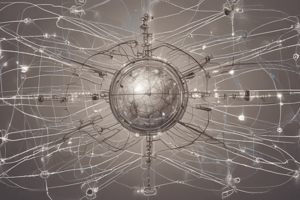Podcast
Questions and Answers
What type of electricity is created when electric charges build up in one place?
What type of electricity is created when electric charges build up in one place?
- Magnetic electricity
- Current electricity
- Dynamic electricity
- Static electricity (correct)
What unit is used to measure electric power?
What unit is used to measure electric power?
- Watt (correct)
- Joule
- Volt
- Ohm
Which statement accurately describes the relationship between electricity and magnetism?
Which statement accurately describes the relationship between electricity and magnetism?
- Electric fields are not affected by magnetic fields.
- A changing magnetic field can produce an electric current. (correct)
- Only magnetic fields produce electric currents.
- Electricity and magnetism are independent phenomena.
Which form of energy is static electricity classified as?
Which form of energy is static electricity classified as?
What happens to electricity when it flows through a conductor?
What happens to electricity when it flows through a conductor?
Which device is an example of static electricity?
Which device is an example of static electricity?
When does electrical potential energy become kinetic energy?
When does electrical potential energy become kinetic energy?
What does electrical energy primarily result from?
What does electrical energy primarily result from?
Which particles orbit around the nucleus of an atom?
Which particles orbit around the nucleus of an atom?
What is the outermost shell of an atom called?
What is the outermost shell of an atom called?
How many electrons can the second shell of an atom hold?
How many electrons can the second shell of an atom hold?
What type of materials generally allow electrons to move freely?
What type of materials generally allow electrons to move freely?
What is electric energy measured in?
What is electric energy measured in?
What happens to valence electrons when they come into contact with another atom?
What happens to valence electrons when they come into contact with another atom?
What distinguishes electrical energy from electricity?
What distinguishes electrical energy from electricity?
Flashcards
Electrical Energy
Electrical Energy
The energy produced by the movement of electric charges.
Atom
Atom
The basic building block of matter.
Electron
Electron
A negatively charged particle orbiting the atom's nucleus.
Valence Electron
Valence Electron
Signup and view all the flashcards
Conductor
Conductor
Signup and view all the flashcards
Insulator
Insulator
Signup and view all the flashcards
Electrical Energy vs Electricity
Electrical Energy vs Electricity
Signup and view all the flashcards
Unit of Electrical Energy
Unit of Electrical Energy
Signup and view all the flashcards
Static Electricity
Static Electricity
Signup and view all the flashcards
Current Electricity
Current Electricity
Signup and view all the flashcards
Electromagnetism
Electromagnetism
Signup and view all the flashcards
Electrical Potential Energy
Electrical Potential Energy
Signup and view all the flashcards
Electrical Kinetic Energy
Electrical Kinetic Energy
Signup and view all the flashcards
Electrical Energy Units
Electrical Energy Units
Signup and view all the flashcards
Relationship Between Electricity and Magnetism
Relationship Between Electricity and Magnetism
Signup and view all the flashcards
Study Notes
Electrical Energy Overview
- Electrical energy is the ability to do work by moving electric charges.
- The strength of the energy is related to the speed of the charges.
- It comes from the movement of electrons between atoms.
Atomic Structure and Electron Movement
- Atoms are the building blocks of matter, with a nucleus containing protons and neutrons.
- Electrons orbit the nucleus in shells.
- Valence electrons in the outermost shell are loosely bound and can move.
- Movement of electrons from one atom to another produces electrical energy.
- Conductors (e.g., metals) allow electrons to move easily.
- Insulators (e.g., plastic, glass) restrict electron movement.
Electrical Energy vs. Electricity
- Electrical energy is the energy from electron movement.
- Electricity is the flow of electrical energy through a conductor.
- Static electricity is a buildup of electrical energy in one place.
- Current electricity flows from one place to another.
Electromagnetism
- Electricity and magnetism are linked.
- An electric current creates a magnetic field around a wire.
- A changing magnetic field creates an electric current.
Units of Electrical Energy
- Units are used to measure different aspects of electrical energy. These include Ampere (electric current), Coulomb (electric charge), Farad (capacitance), Henry (inductance), Hertz (frequency), Ohm (resistance), Joule (energy), Kilowatt-hour (energy), Volt (potential difference, voltage), Watt (electric power).
Potential vs. Kinetic Energy
- Electrical energy can be either potential or kinetic.
- Static electricity is potential electrical energy.
- Moving electrons are kinetic electrical energy.
Examples of Electrical Energy
- Batteries
- Appliances
- Static electricity
- Capacitors
Studying That Suits You
Use AI to generate personalized quizzes and flashcards to suit your learning preferences.




